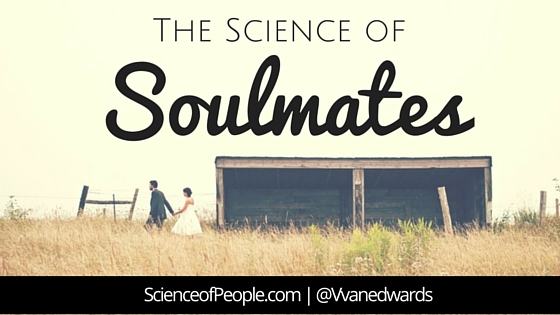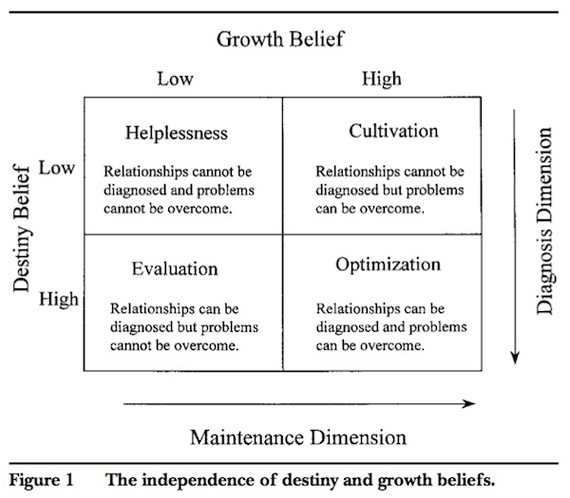Do you believe in soulmates?
If so, you're not alone. According to a Marist poll:
- 73% of Americans believe in soulmates.
- More men than women believe that they are destined to find their one, true soulmate (males: 74%, females: 71%).
- 79% of people younger than 45 believe in soulmates, while only 69% of those over 45 do.
I was pretty surprised to see how many people believe in soulmates. And then I got to wondering-does this help or hurt us?
Does your relationship have a destiny?
The Science of Soulmates
I wish I had science to tell you if soulmates are in fact real, but instead I found a set of amazing research looking at whether the belief in soulmates helps or hurts us. It all boils down to how you answer this question:
Do you believe there is one person who is meant just for you?
Researcher Raymond Knee and colleagues wanted to know if there was a difference in how people answered this question. He found that people have either:
- Destiny Beliefs: I am destined to be with a specific person. I have a soulmate. I have one person who is meant for me.
- Growth Beliefs: Relationships progress slowly and we grow to fit together. Relationships take effort. You can build love.
Which camp do you fall in? This is no small question. Your answer to that question greatly dictates the success or failure of your relationship. Specifically, here's the big news:
People who believe in soulmates are more likely to break up, give up and have difficult relationships.
People who believe in soulmates are using their mental energy to assess the person they are with. In other words, they are constantly asking themselves:
- Is this my person?
- Can I do better?
- Is this the best I can do?
- Is this it?
Whereas, people with growth beliefs are asking themselves very different internal questions:
- Are we a good fit?
- How can I be a better partner?
- How can we get closer?
- What can I do to make this better?
The Soulmate Trap:
If you believe that there is only one person for you, you are more likely to spend energy and time looking for that person instead of cultivating existing relationships.
Destiny Believers have passionate, intense, fire-y short-term relationships, but often times become disillusioned and frustrated when something inevitably goes wrong. They believe in 'deal-breakers' and are constantly looking for the 'perfect' person. They often view compromise as settling. When something negative happens in the relationship they think, "Better move on and find my person."
Growth Believers take a bit longer to commit. Even early in the relationship they are more motivated to find solutions, compromise or explore new ideas. They often view compromising as growth. When something negative happens in the relationship they think, "Better work this out."
From Knee et al. (2001)
The Soulmate Solution:
Looking for your soulmate decreases the motivation to make relationships work. This doesn't mean settling, it means being open to growth and adaptability. Here are a few ideas for you to think about:
Step One: Patterns
In the past, have you been overcome by deal breakers? Do you flee the moment you hit a bump in the road? Are you dating the same person over and over again? I want you to examine your relationship patterns and connect this to your idea about soulmates. If you are a destiny believer, see if this belief has served you in the past. If you are a growth believer, examine whether your history can be learned from.
Step Two: Changeable or Unchangeable
Not all bumps in relationships are minor. Of course, we have deal breakers that are there for a reason. But there is a distinction between a fundamental value difference and an annoyance. Think about current or past bumps and deal breakers. Were they fixable? Compromise-able? Changeable?
Step Three: Adaptation is Advancement
Flexibility, growth and compromise are signs of strength NOT weakness. We tend to believe that adapting our refitting our ideas to someone else's is a sign of weakness. The truth is:
The strongest people are sure enough in their own values and beliefs that compromise becomes a gift.
When you love someone, you grow for them, you grow with them, you change together.
I personally don't believe there are 'perfect' people, people without flaws or people without areas for improvement. We can all be better. Let's help the people we love get better with us. I think a true 'soulmate' is someone who challenges you to be better and you do the same for them.


